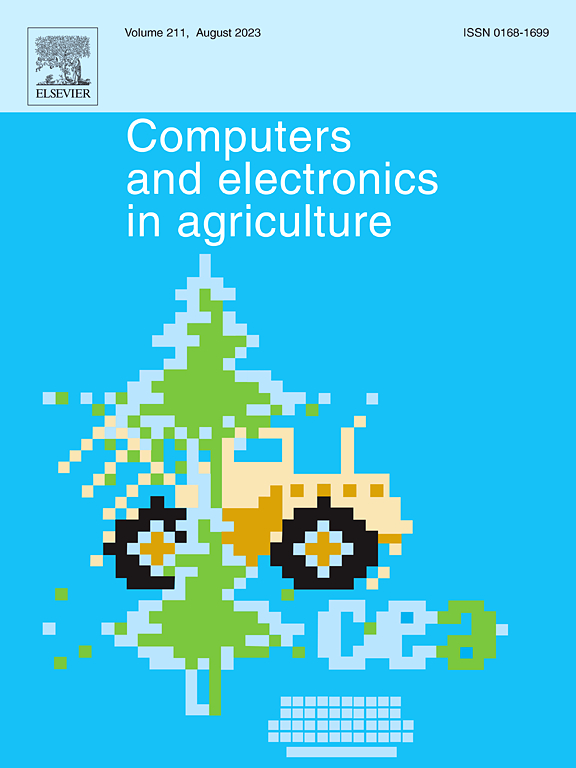Towards high throughput in-field detection and quantification of wheat foliar diseases using deep learning
IF 8.9
1区 农林科学
Q1 AGRICULTURE, MULTIDISCIPLINARY
引用次数: 0
Abstract
Reliable, quantitative information on the presence and severity of crop diseases is essential for site-specific crop management and resistance breeding. Successful analysis of leaves under naturally variable lighting, presenting multiple disorders, and across phenological stages is a critical step towards high-throughput disease assessments directly in the field.
Here, we present a dataset comprising 422 high resolution images of flattened leaves captured under variable outdoor lighting with polygon annotations of leaves, leaf necrosis and insect damage as well as point annotations of Septoria tritici blotch (STB) fruiting bodies (pycnidia) and rust pustules.
Based on this dataset, we demonstrate the capability of deep learning for keypoint detection of pycnidia () and rust pustules () combined with semantic segmentation of leaves (), leaf necrosis () and insect damage () to reliably detect and quantify the presence of STB, leaf rusts, and insect damage on symptom level under natural outdoor conditions. An analysis of intra- and inter-annotator agreement on selected images demonstrated that the proposed method achieved a performance close to that of annotators in the majority of the scenarios.
We validated the generalization capabilities of the proposed method by testing it on images of unstructured canopies acquired directly in the field and without manual interaction with single leaves. This enables significantly higher throughput and automated data acquisition, which is critical to harness the full potential of image-based disease assessments. Model predictions were in good agreement with visual assessments of in-focus regions in these images, despite the presence of new challenges such as variable orientation of leaves and more complex lighting. This underscores the principle feasibility of diagnosing and quantifying the severity of foliar diseases under field conditions using the proposed imaging setup and image processing methods.
By demonstrating the ability to diagnose and quantify the severity of multiple diseases in highly complex field scenarios, we lay the groundwork for high-throughput in-field assessments of foliar diseases that can support resistance breeding and the implementation of core principles of precision agriculture.
利用深度学习技术实现小麦叶面病害的高通量田间检测与量化
关于作物病害存在和严重程度的可靠定量信息对于特定地点的作物管理和抗性育种至关重要。成功分析自然变化光照下的叶片,呈现多种紊乱,跨物候阶段是直接在现场进行高通量疾病评估的关键一步。在这里,我们展示了一个包含422张高分辨率图像的数据集,这些图像是在可变室外照明下拍摄的平坦叶片,具有叶片多边形注释、叶片坏死和昆虫损害,以及稻瘟病斑(STB)、子实体(pycnidia)和锈病脓疱的点注释。基于该数据集,我们展示了深度学习的关键点检测能力,结合叶片(IoU=0.96)、叶坏死(IoU=0.77)和虫害(IoU=0.69)的语义分割,在自然室外条件下可靠地检测和量化STB、叶锈病和虫害在症状水平上的存在。对选定图像的注释器内部和注释器之间的一致性分析表明,所提出的方法在大多数情况下取得了接近注释器的性能。我们通过对直接在野外获得的非结构化冠层图像进行测试,验证了所提出方法的泛化能力,而无需人工与单叶进行交互。这可以显著提高吞吐量和自动化数据采集,这对于充分利用基于图像的疾病评估的潜力至关重要。尽管存在新的挑战,如树叶的方向变化和更复杂的照明,但模型预测与这些图像中焦点区域的视觉评估非常一致。这强调了利用所提出的成像设置和图像处理方法在田间条件下诊断和量化叶面疾病严重程度的原理可行性。通过展示在高度复杂的田间情况下诊断和量化多种疾病严重程度的能力,我们为高通量的田间叶面疾病评估奠定了基础,从而支持抗性育种和精准农业核心原则的实施。
本文章由计算机程序翻译,如有差异,请以英文原文为准。
求助全文
约1分钟内获得全文
求助全文
来源期刊

Computers and Electronics in Agriculture
工程技术-计算机:跨学科应用
CiteScore
15.30
自引率
14.50%
发文量
800
审稿时长
62 days
期刊介绍:
Computers and Electronics in Agriculture provides international coverage of advancements in computer hardware, software, electronic instrumentation, and control systems applied to agricultural challenges. Encompassing agronomy, horticulture, forestry, aquaculture, and animal farming, the journal publishes original papers, reviews, and applications notes. It explores the use of computers and electronics in plant or animal agricultural production, covering topics like agricultural soils, water, pests, controlled environments, and waste. The scope extends to on-farm post-harvest operations and relevant technologies, including artificial intelligence, sensors, machine vision, robotics, networking, and simulation modeling. Its companion journal, Smart Agricultural Technology, continues the focus on smart applications in production agriculture.
 求助内容:
求助内容: 应助结果提醒方式:
应助结果提醒方式:


